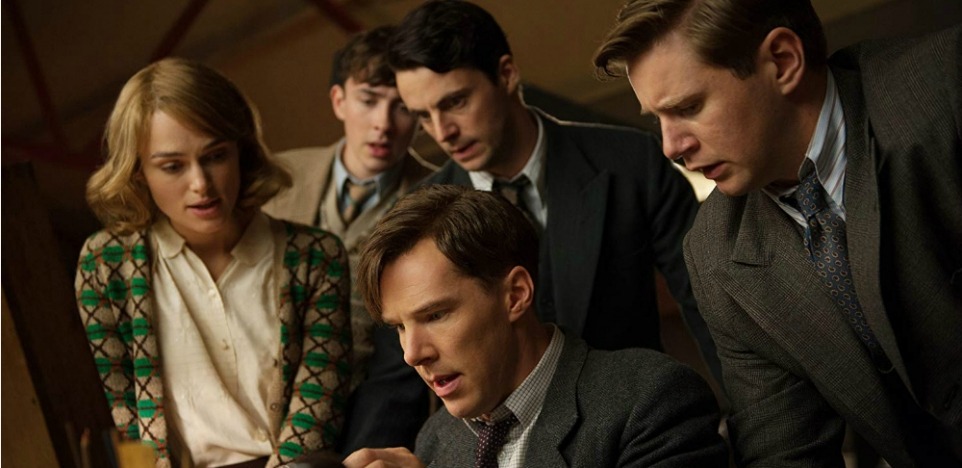"I not only have my secrets. I am my secrets. And you are your secrets. Our secrets are human secrets, and our trusting each other enough to share them with each other has much to do with the secret of what it is to be human."
— Frederick Buechner
We live in a culture that is ambivalent about secrecy: on the one hand, there is the widespread feeling that we have a right to secrecy and when that right is attacked by government, institutions, or corporations, we get very upset. On the other hand, most of us have little patience or toleration for kith and kin who keep secrets from us. The Imitation Game explores the many different kinds of secrecy in the strange and exotic life of a mathematical genius and hero of World War II, Alan Turing. As this mesmerizing movie reveals, secrets permeate society and have the power to unite people — and to divide them.
As a boy, Alan is tormented by his peers in school for being different and weird. The one friend he makes shares his love of mathematics and gives him a book of cryptograms. However, a secret kept by this friend deeply wounds Alan and has a dire effect on his willingness to open himself to others or to trust them with his own secrets.
In 1939, this 27-year-old mathematical genius, a teaching fellow at Cambridge, arrives at Bletchley Park, home to the Government Code and Cypher School. In a rousingly good scene, Turing (Benedict Cumberbatch) demonstrates his arrogance as he squares off with a cocky Royal Navy Commander (Charles Dance) who dislikes him but hires him anyway to join an elite team of code breakers. Used to working alone, he isolates himself from his co-workers, including John Cairncross (Alan Leech), who has a secret of his own, and Hugh Alexander (Matthew Goode), a charismatic chess player and bon vivant who heads the team. The goal of the project is to crack the Germans' Enigma codes as World War II escalates. Of course, everything they do is top secret and they cannot talk with anybody about what they are doing.
Alexander and the others have no success in decrypting the German cipher machine, a task made very difficult because the codes are changed every 24 hours. Turing, after much thought and experimentation, decides that the best approach is to build a machine that can beat the Enigma machine at its own game. When the Navy Commander refuses to take him seriously, Turing sends a letter to Winston Churchill who puts him in charge of the project. He immediately fires two people and welcomes Joan Clarke (Keira Knightley), whose quick mind has made her a wizard at crossword puzzles and mathematical conundrums.
In his English-language debut, Norwegian director Morten Tyldum proves to be a skillful juggler as he keeps many different storylines in the air with flashbacks and other cinematic devices designed to keep us entranced by the escalation of the war by Hitler and his armies. Cumberbatch, who has been so impressive in the TV series Sherlock Holmes, puts in an Academy-award caliber performance as Turing, a complicated young man who swings between moods of arrogant superiority based on his intellect and childish incompetence evident in his inability to take good care of himself. His social awkwardness grows out of the feeling of being a man on the margins. It is fascinating to watch this character's growing affection for the machine he has built and named Christopher.
Screenplay writer Graham Moore has adapted Andrew Hodges' The Enigma for the screen with panache. He has a genuine respect for oddballs as evidenced by one of our favorite lines from the screenplay: "Sometimes it's the people no one expects anything from who do the things no one expects."
Given all the tension, frustrations, and battles with his superiors, it's an exhilarating moment when Turing triumphs by busting the Enigma code. But, much to the team's distress, they realize that they will have to keep their accomplishment secret, lest the Germans immediately switch to another system. Working with a chameleon-like M16 agent, Stewart Menzies (Mark Strong), they have to choose which information to use to save lives and which to ignore for the rest of the war — yes, another secret.
A final secret that proves to be most painful is Turing's homosexuality, which is illegal in England at the time. In 1952, he is arrested by the police and convicted of gross indecency. Instead of going to prison and abandoning his work, he opts for a form of chemical castration, which has dire effects on his mind and body.
We learn from end notes on the screen that this genius who ushered in the dawn of the computer age committed suicide in 1954. His strange life was riddled with cover-ups and concealments. Through his story we gain more understanding of the biggest secret of all — the secret of what it means to be human.
